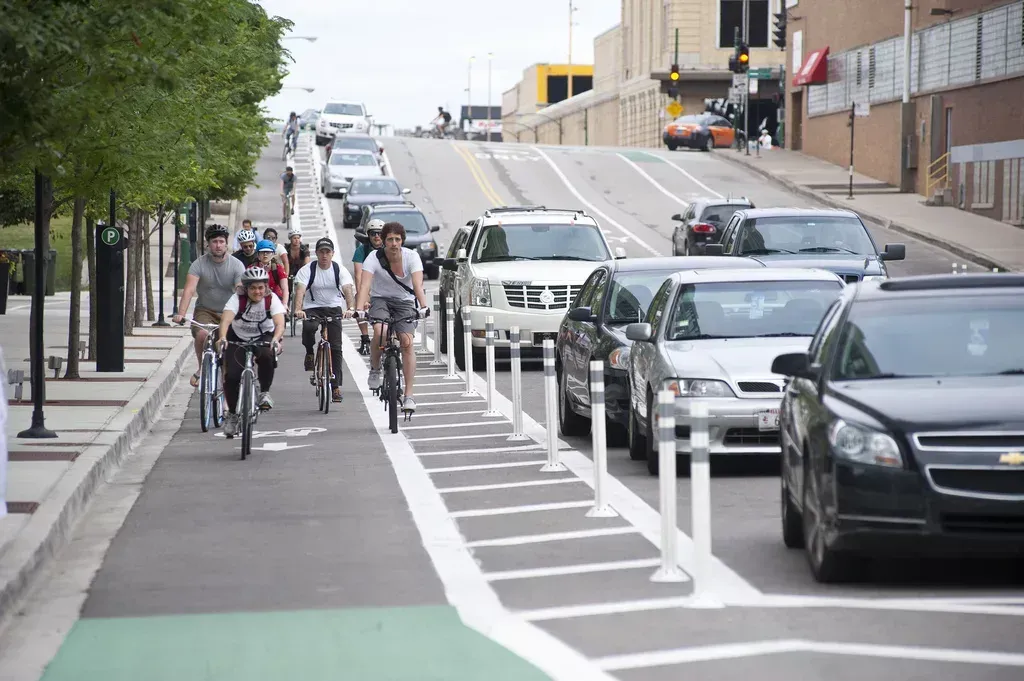Americans Shouldn’t Have to Drive, but the Law Insists on It

When we think about getting more people on bikes and removing cars from the roadway (because the benefits are essentially endless) we must remember: In America Cars Are Mandatory, Dangerous and Heavily Subsidized
Law professor Gregory Shill writing for The Atlantic dropped one of the best articles on cars in America today; Americans Shouldn’t Have to Drive, but the Law Insists on It. The first line of the piece is perfect: “In a country where the laws compel the use of cars, Americans are condemned to lose friends and relatives to traffic violence.” The impact on cyclists doesn’t need clarification. I grabbed a few of my favorite bits, but really you should just go read the whole thing.
Let’s begin at the state and local level. A key player in the story of automobile supremacy is single-family-only zoning, a shadow segregation regime that is now justifiably on the defensive for outlawing duplexes and apartments in huge swaths of the country. Through these and other land-use restrictions-laws that separate residential and commercial areas or require needlessly large yards-zoning rules scatter Americans across distances and highway-like roads that are impractical or dangerous to traverse on foot. The resulting densities are also too low to sustain high-frequency public transit.
Further entrenching automobile supremacy are laws that require landowners who build housing and office space to build housing for cars as well. In large part because of parking quotas, parking lots now cover more than a third of the land area of some U.S. cities; Houston is estimated to have 30 parking spaces for every resident. As UCLA urban planning professor Donald Shoup has written, this mismatch flows from legal mandates rather than market demand. Every employee who brings a car to the office essentially doubles the amount of space he takes up at work, and in urban areas his employer may be required by law to build him a $50,000 garage parking space.
Car ownership is heavily subsidized at the local, state and federal level. Our laws and regulations have built a nation where cars are mandatory. And people scoff at building protected bike lanes…
Why are we taxing bus riders to pay rich people to buy McMansions and luxury electric SUVs?
This was new to me and is incredibly screwed up, speed limits aren’t about safety.
The National Transportation Safety Board has determined that speed is a top risk factor in motor vehicle crashes. Yet the most prominent way of setting and adjusting speed limits, known as the operating speed method, actually incentivizes faster driving. It calls for setting speed limits that 85 percent of drivers will obey. This method makes little provision for whether there’s a park or senior center on a street, or for people walking or biking.
As a matter of law, the operating speed method is exceptional. It enables those who violate the law-speeding motorists-to rewrite it: speed limits ratchet higher until no more than 15 percent of motorists violate them. The perverse incentives are obvious. Imagine a rule saying that, once 15 percent of Americans acquired an illegal type of machine gun, that weapon would automatically become legal.
On how we change this disgusting status quo:
Litigation for dangerous street design is another promising way to hold public entities accountable. So far, plaintiffs have mostly sought money damages, but they can also seek design changes through injunctive relief, including by class action. This has the potential to move not only laws and budgets but the entire discourse around street safety.
Finally, reformers could seek recognition of the freedom to walk. The federal Americans With Disabilities Act and state and local counterparts, as well as case law recognizing a constitutional right to movement, suggest such a right to mobility.
So, if you get killed by a car, be sure to have your family start litigation against the corrupt government entity that made the road unsafe in the first place.





